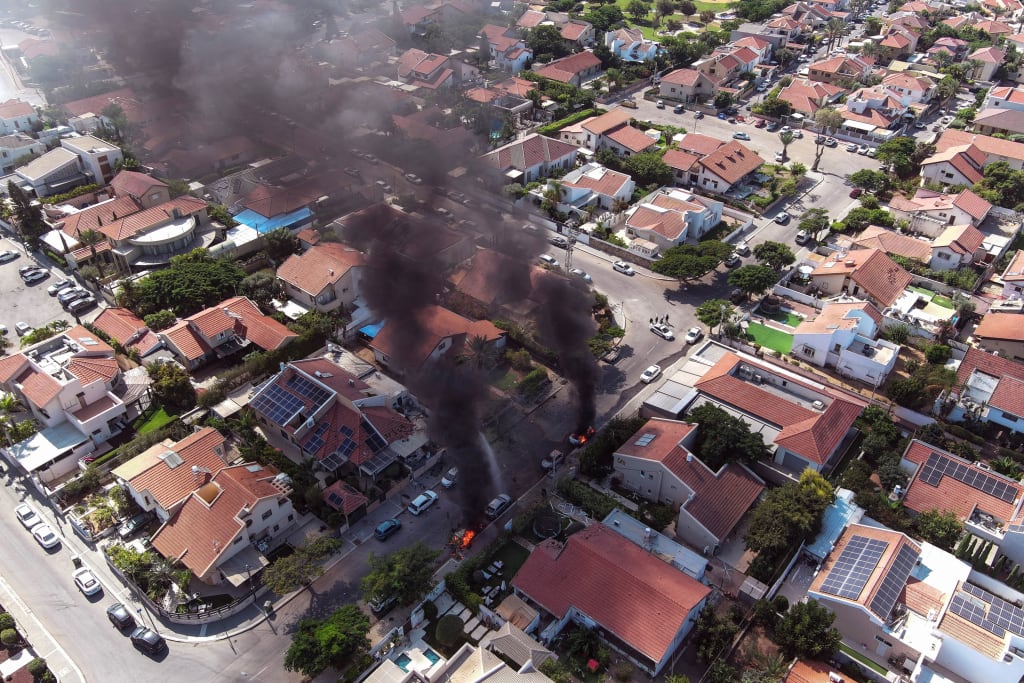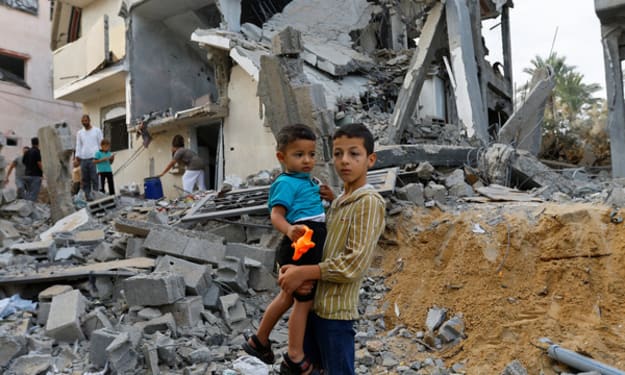As Israel retaliates against Hamas, concerns remain regarding the arduous path that lies ahead.
https://www.inquirer.com/opinion/israel-gaza-hamas-crisis-survive-war-20231011.html

It is difficult to anticipate how the fight with Hamas terrorists will turn out as Israel continues to bomb Gaza and sends troops closer to the border.
Israel and much of the world have been appalled by the scenes of carnage in Israeli towns and villages near the Gaza border. 900 people have died in these incidents, including scores of families with small children who were executed in cold blood; young women who were dragged off as hostages, some of whom had babies; and 260 young people who were shot and killed at a music concert. This was a killing a la ISIS.
However, Israel faces enormous obstacles in its stated objective of dismantling Hamas. About 150 Israelis are being held captive in Gaza by the terrorist organization and other militants, who have threatened to kill them if the bombing doesn't stop. The conflict may spread to Lebanon, where Hezbollah fighters with Iranian support have positioned 150,000 missiles toward Israel, as well as the occupied West Bank.
A concern that looms over this crisis is whether Benjamin Netanyahu's administration, currently in power in Israel, is capable of rising to the enormous challenge in the wake of the security and intelligence lapses that allowed Hamas to enter.
Here are some reader-submitted questions that I'm thinking about answering, based on my own experiences over several decades in Israel, the West Bank, and Gaza, as well as on talks I've had with Israelis and on conference calls.
How was this catastrophe possible to occur?
Israel experienced an unthinkable breach in security. According to Egyptian intelligence officers, persistent warnings from their Israeli counterparts that "something big" was about to happen with Gaza were disregarded. Although this is denied by Netanyahu's office, it appears that before to the attack, Hamas training exercises near the Gaza border barrier were written off as insignificant.
Nimrod Novik, an Israeli scholar on the Middle East who advised former Prime Minister Shimon Peres and is a board member of the Foreign Policy Research Institute in Philadelphia, said that "no one [in the government] was willing to see that they were practicing." "Eighty percent of the Israeli standing army was deployed policing the West Bank," he claimed, referring to the territory that government officials are trying to acquire. This implied that a small number of exhausted troops were defending the Gaza border, and they were quickly overwhelmed.
The majority of experts agree that undermining a possible U.S.-led agreement to restore diplomatic relations between Israel and Saudi Arabia was a primary objective. Iran, a major supporter of Hamas, views such an arrangement as dangerous since, should it materialize, it would provide the Saudis with weapons, U.S. security guarantees, and potentially even nuclear technology. It would also provide virtually little to the Palestinians.
And what was the purpose of Hamas's latest attack?
But Hamas had more ambitious plans. Taking hostages offers Hamas leverage in return for Palestinian detainees held in Israeli prisons. Furthermore, its military "success" raises its stature in the West Bank, which it hopes to seize upon the retirement of Mahmoud Abbas, the 86-year-old president of the Palestinian Authority and leader of the Fatah faction that opposes Hamas. It also probably anticipates that fighters from Hezbollah in southern Lebanon will eventually join the conflict.
In the interim, the West Bank-based Palestinian Authority, whose police force assists Israeli forces in neutralizing Hamas militants, has been undercut by the Netanyahu administration and has been denied funding. Israeli media attribute this paradox to the PA's support for a two-state solution, which Netanyahu rejects, in contrast to Hamas's goal of destroying Israel.
Why do people in Gaza back Hamas?
Not everybody has in the past. In the 2006 Palestinian elections, Hamas received under 33% of the vote, primarily due to public dissatisfaction with Fatah's corruption, but thanks to an odd electoral method, it was awarded a majority of parliamentary seats. Then, in 2007, Hamas used military force to capture complete control of Gaza. Since then, Israel has kept a siege in place on Gaza's land, sea, and air, turning the region into a virtual jail where jobless youth are all too readily lured into a violent Islamist organization that denies Israel's right to exist. There is no way for Gazan citizens who disagree with Hamas' autocratic administration to contest it. Now, Israel's bombs and Hamas's war are their only options.
Is Israel able to military defeat Hamas?
vague. Israel has made multiple prior attempts using bombings and small-scale military operations. Hamas has recovered each time. Previous Israeli governments have attempted to stay out of a risky, protracted ground conflict that has lasted for 25 kilometers along a narrow zone that is three to seven miles broad. a city with two million inhabitants packed into narrow streets and lanes that are littered with explosives. After spending 20 years ensnared in southern Lebanon, Israel does not wish to find itself back in Gaza.
What is the most favorable result? And is the US able to assist?
First, it would be preferable if a larger conflict could be averted. Secondly, if Arab middlemen could arrange a prisoner swap, like Qatar (which gives Hamas the money it needs to maintain its rule). Third, whether the Netanyahu administration is able to implement a military plan that incorporates a workable long-term plan for handling Gaza and the West Bank.
Currently, all of the aforementioned appear dubious. If Iran is persuaded that a larger conflict will ultimately backfire on Tehran, the first option might be feasible. Regarding the second, Hamas has declared that there won't be a prisoner swap until the conflict is over.
The third, though, is the most troubling because Israel is facing one of the biggest obstacles in its history. As has been the custom throughout previous wars, Netanyahu is still opposing the formation of a national unity government with opposition parties as of this writing. For a large portion of the nation to believe that its leaders won't commit the same mistakes that allowed this catastrophe to happen, such a cabinet is necessary.
American support, whether in the form of weaponry, intelligence, or diplomacy, will only be beneficial if the Israeli government has a successful short- and long-term plan.
However, Netanyahu has thus far rejected calls from the opposition to remove his most extremist and rash cabinet ministers, who would force Israel to pursue a futile war that extends into Gaza and the West Bank.
About the Creator
Fox World News
My name is Iqram, I am a data Entry Expert in Dhaka, Bangladesh. Specialist for Process solution image editing and online media production all so illustration and branding project.






Comments
There are no comments for this story
Be the first to respond and start the conversation.